Laurence Tubiana
@laurencetubiana.bsky.social
840 followers
1 following
110 posts
Economiste, professeure, diplomate. Accord de Paris & Convention citoyenne. A la tête de la Fondation Européenne pour le climat. Opinions personnelles.
Posts
Media
Videos
Starter Packs







